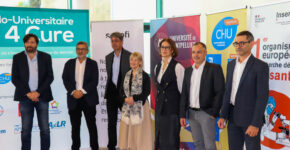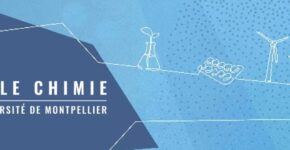Water Management, Actors, Users (G-EAU)

The UMR Gestion de l'Eau, Acteurs, Usages brings together 90 permanent researchers and engineers and some 50 PhD and post-doctoral students from all disciplines, working together on integrated and adaptive water management issues. It conducts research on the trajectories of socio-hydrosystems and their regulation; it contributes to the design and evaluation of tools facilitating the implementation of innovative public policies concerning water; it participates in the multidisciplinary training of students in the field of water. UMR G-EAU, part of the MUSE I-Site, is a member of ICIREWARD, a UNESCO Category 2 center on water in Montpellier.
The core of the UMR G-EAU project is to understand the functioning of socio-hydrosystems, both in normal operation and in times of crisis or stress (shortage, flooding, pollution). We analyze hydrological, technical, social, economic and political processes within a water-related territory, and their consequences. We are also mobilizing our interdisciplinary strength to analyze the combined effects of these processes, and ultimately to identify the possibilities for governance and adaptation in complex and uncertain environments. The project includes the design and testing, in interaction with society, of tools and devices aimed at revealing the workings of these systems and intervening on their trajectory.
Originating from teams working on irrigated systems, UMR G-EAU has gradually broadened its focus towards integrated management. It now approaches water-related territories as complex systems, mobilizing a diversity of viewpoints:
- Multiple uses and interests: irrigation, drinking water, recreation, energy, purification, flood protection
- Multiple types of water: surface water, groundwater, wastewater
- Plurality of processes: water and pollutant transfers, irrigation technologies, economic instruments, public participation, modes of appropriation, etc.
- Multiple modes of regulation: river and canal infrastructures, water access and land use policies, water use standards.
- Plurality of disciplines
- For all its research, UMR G-EAU emphasizes approaches rooted in case studies. This means investing in research based on field observation, complemented by experimental approaches carried out in interaction with users and/or managers. To build on the knowledge thus generated, the UMR relies on a wide network of partners and research sites throughout the world, in France and in developing countries, representing a diversity of water-related issues and hydro-ecological, socio-economic and political contexts. A third of our staff are expatriates in North Africa, West and Southern Africa, and South-East Asia. In France, we work closely with institutions in charge of watershed management. Our involvement in the field has led to close interaction with the players involved.
Finally, UMR G-EAU is committed to transferring its results. Three avenues are being pursued to this end:
- Testing the proposed techniques and tools with local institutions,
- The training of students in the North within the Montpellier Water Master's program and the engineering schools supervising the UMR (Montpellier SupAgro and AgroParisTech), and in the South within the Master's programs run by our host partners,
- Hosting partner companies, especially start-ups.
Label: Unité Mixte de Research (UMR)
Main supervisors: CIRAD - IRD - INRAE - AgroParis Tech - Institut Agro - BRGM
Secondary supervisors: UM
Research divisions: Pôle Agriculture-Environnement-Biodiversité (AEB)
Doctoral schools: EDEG: Economics Management - GAIA: Biodiversity, Agriculture, Food, Environment, Land, Water



